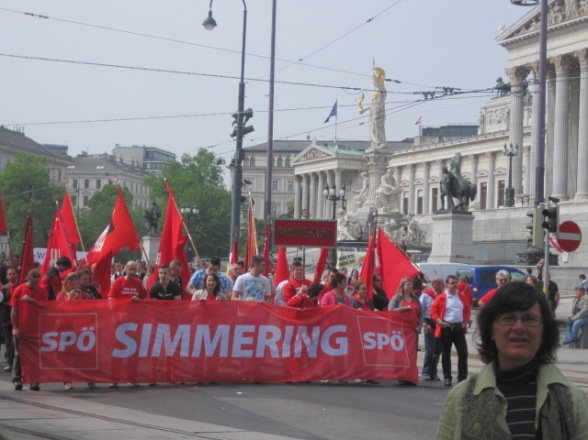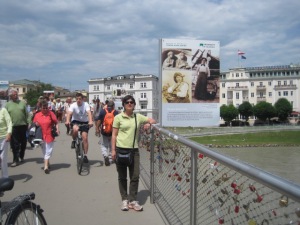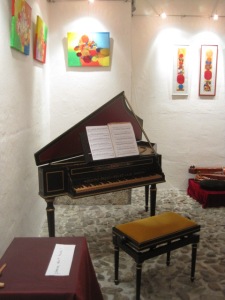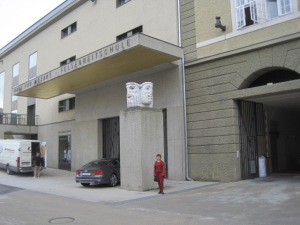Perhaps the physical presence of a history that stretches across many centuries and several continents makes Austrians take note of what came before more often than U.S. Americans. To understand that one’s homeland was once larger, stronger, greater, is elemental to being an heir to Habsburg history. The borders ballooned and shrank over hundreds of years, leaving a remnant for the vanquished after the world wars of the twentieth century. Policy mavens of today use that long history to promote linkages, to improve Austria’s international position. My final sojourning days in Europe included travel to several former Habsburg locations in northern Italy, Hungary, and Germany as well as introducing my family to the imperial grandeur of Vienna. It seems an unending balancing act, to accept the changed status gracefully—to still appreciate and make the best of the past in the present. And so I officially end my sojourning blog, a former Fulbrighter, writing from a part of Florida once under the Habsburg realm.
Return Migration
The plane landed at midnight. My Fulbright stands now a fait accompli, those final days of the semester, filled to the brim. One of the last stops included a stroll across the river. Colleagues in Salzburg, with a little help from the City Archive and Integration Bureau, designed a wonderful exhibit about coming, going, and staying—a history of migration to and from the region. It decked one of the pedestrian bridges across the Salzach, telling the stories of those who left as well as those who came, linking the past and the present, domestic servants and archbishops. Tourists could pause, school classes could read, and locals could contemplate as they passed pictures of traders in Venice, Protestants exiles, and guest workers. One of the panels noted the thousands of students and professors who came during the 17th and 18th centuries to the University of Salzburg, and the 112 countries now represented among those who attend. I now join that history. The exhibition came down about the same time I left town to travel with my family, exploring surrounding lands, and then to return to my home in Florida.
Underlining acceptance
Language tells a story. Alive to social and political change, it may dance to a new tune. When I took German at the university in the 1980s we marched to pronouns and leaned the ins and outs of gender. When I attended a language workshop here in Salzburg, the steps had changed. For one, an educated person now needs to work towards gender inclusivity. In recent history that meant male and female pairs: to refer to a group of students in German I address female and male students separately. To shorten the written form I might combine them with a slash (Student/Innen). More progressive language mavens might utilize a single under-strike (Student_innen) which hints at more flexibility in gender definitions. In fact, gender relations shift as I write. From the solo steps of women into public speech and public office, moves towards gender equality include more than just women. France approved same-sex marriage this spring and the U.S. Supreme Court just struck down parts of a federal law denying benefits to same sex spouses. Language, law, life—each travels its own set of steps into new territory.
Land of Music
To live in a city with many music students means ongoing opportunities for concerts, true of both Salzburg and Tallahassee. Salzburg differs, however, in promoting music as a central feature of its tourism agenda. Yes Sound of Music tours abound, but that aside, Mozart’s birthplace teems with foreigners who walk his haunts day in and day out. The Residence and the Fortress offer concerts featuring classical music (Mozart required) several times a week. Churches stage concerts regularly. Envision organs, orchestra, and mass choir in the cathedral. Walk through a portico or across a pedestrian bridge and street musicians entertain for what people toss in the hat. In the world of Salzburg music, however, the Festspiele reign. By now the Festival boasts 90 years of world-class opera, theater, and classical music talent in various dedicated venues: six weeks, expensive tickets, sold out. It features Hugo von Hofmannsthal’s version of the morality play Everyman, where death comes to claim a rich man. Grandson follows in grandfather’s footsteps as lead character this year, but with new staging the new century. In this world of classical entertainment, I miss participating. The choir in which I normally sing performed Mozart´s Mass in C minor this spring and heads for a music festival in Paris next month. I just listen in the land of Mozart.
Bordering change
As the U.S. Congress debates immigration reform, border control sparks heated political rhetoric. In my lifetime the trajectories of border security in North America and Europe moved in opposite directions. When I was a child in Michigan my family would sometimes take a Sunday drive to Canada for lunch. At the border the officials looked at the driver’s license and welcomed us, or they just waved us through. My last trips to Canada required a passport and interrogation in both directions across a clearly militarized frontier. On the other side of the ocean: during graduate school when I first visited Austria every neighboring nation enforced its boundaries. We collected passport stamps and compared stories of questioning and delay. The end of the Cold War, expansion of the EU, and more specifically the Schengen Agreement contributed to the opening of many of the borders within Europe. No more going through a passport check to travel from Austria to Germany. From Salzburg you can easily see Germany, even walk across the largely invisible border. The shift towards greater freedom of movement here contrasts the increasing limitations on that freedom surrounding the United States.
Hundred-Year Flood
Catastrophes bring out extremes. Record rainfall last weekend overran rivers in Germany and Austria, including in Salzburg, where the Salzach River rose 8.5 meters (almost 28 feet). Emergency planning and water control, in part the result of dealing with a flood in 2002, meant the city escaped this time with little damage. I missed the worst of the downpour and high water, away at a family gathering, but not the flooding more generally. The regular train route from Munich to Salzburg closed and overflowing water made a mess in the basement of my apartment building. As I made my way back to Salzburg on a circuitous route through the wet, but still passable part of Bavaria, I encountered travelers who first fought for seats and then shared weather stories. As part of the crowd, my accent did not say Florida, but my hurricane stories did. We call them “natural” disasters for a reason, yet the preparation and governmental as well as civic response play heavily into their impact. By the time I left Salzburg city for a Fulbright gathering today, workers were hosing down the riverbank walls and walks, erasing the traces of this hundred-year flood.
Mixed memories
How do we honor those who lost their lives in the military? My whirlwind trip to witness my daughter’s high school graduation in the U.S. coincided with Memorial Day, a holiday devoted to remembering those who have died, especially in war. Wars generate winners and losers. Honoring “the greatest generation,” the Americans who fought in World War II, along with all others who have worn a military uniform comes almost without thought in the U.S. I have marched in celebratory parades many times. To honor the Austrians who have fallen in lost causes remains more problematic. In Salzburg the communal cemetery near my apartment includes a more subdued monument to war dead from both world wars. In another part of town sits a more recent statue dedicated to the Trümmerfrauen, women of the rubble, who had to rebuild (without men in many cases) in the aftermath of massive bombing and other wartime destruction. I am torn. Commemoration and learning from the past take different forms. Decrying the Nazi past unites nigh to all. But for my students in Austria, remembering the war means taking the lessons beyond history to the present, challenging ethnic prejudice, militarism, and excessive displays of patriotism. They apply these to the rule of might that allows search without warrant, shooting on another’s shores, and the continuation of Guantanamo. They question what I see on display for Memorial Day.
Marching to a Different Drummer

This gallery contains 3 photos.
Not just the massive May Day march to city hall in Vienna, which I attended, separates Austrian politics from U.S. counterparts. Political programs in the U.S. fall towards the right in comparison. In part the proportional representation of this parliamentary system supports a little more variety in terms of parties. In part Austrians expect more […]
Travel writing
I opened Abraham Kuyper’s* suitcase–and an exhibition on travel writings! Scholars at the Free University in Amsterdam organized a conference on travel accounts, particularly those by women, and invited me to present the keynote. The conference title reflected both the trajectory and the bilingual experience: tracking female trails, reisverhalen in boek en brief** . So I came, I lectured, I rang the bell heralding the official start of the exhibition. This blog falls somewhere in the realm of travel writings, making me more conscious of the critique one faces as an outsider-commentator. In Amsterdam my talk asked whether the letters of cross-border migrants serve as travel writings. My short answer: yes, but not according to literary scholars and librarians. I pled for more flexibility because immigrant letters go out to audiences with less literary tastes, bringing them into contact with distant places. And more, the writers of these more informal accounts include more women and people beyond the elite. So I spoke of Dutch American migrants and missionaries, women whose writings function at least in part as travel accounts. I stretched my capabilities, talking and listening in Dutch as well as English, sustaining and building connections across borders.
*Kuyper’s fame came as theologian, writer, and politician in the Netherlands in the era around 1900.
**Travel writings in book and letter
The T-word
You too may mutter the T-word under your breath at times. I do often. Technology lures with promises of instant contact, reaches into our pockets for increasing shares of the purse. But does it deliver? Coming from and living in “fully” interconnected places does not mean connections exist or the devices that sustain them function. The hours and energy I spent trying to bring a literal T-stick to do its designated task, to connect my home computer to cyberspace, lost. Multiple other “flukes” required technological knowledge I neither possessed nor could understand when tech consultants tried to explain (to our increasing mutual irritation). My virtual phone conversations croak, sputter, and die. At least in my memory of sojourns past, land lines operated better. My son and I wrestle regularly with a transatlantic online school world that works often, but not always. Making school exciting—flash!–means making it slow or no go for a meager modem. For relief I think of the North American correspondents of the 1600s, who sent three versions of one letter with different ships across the Atlantic in hopes that one would arrive. “Good connections” meant that message arrived and the writer received an answer–one letter in each direction in the course of the sailing season. The expectation of instant, visual, in-person quality: these cause my frustration.












